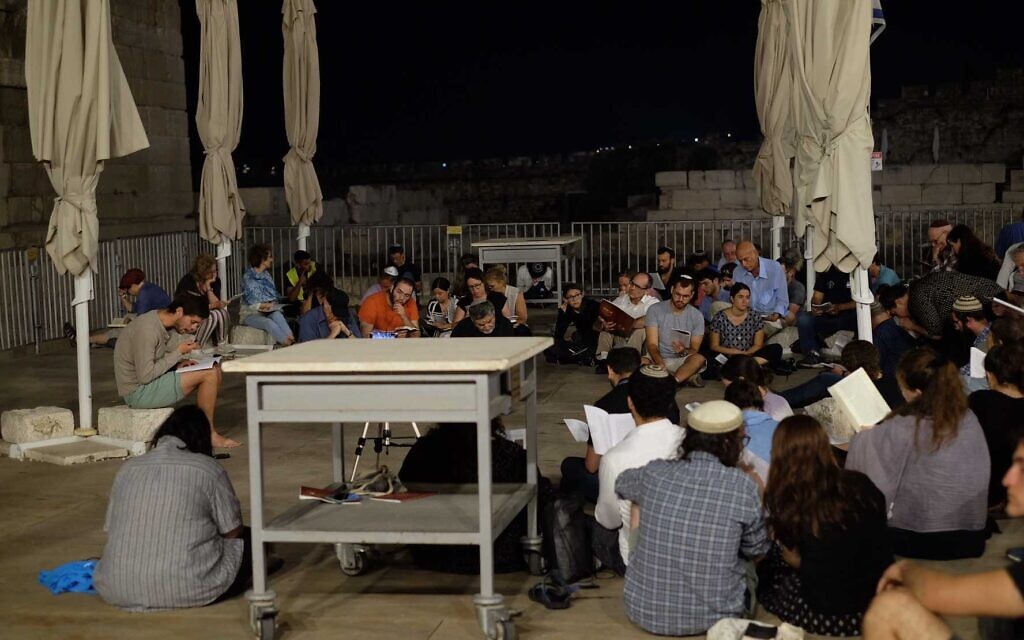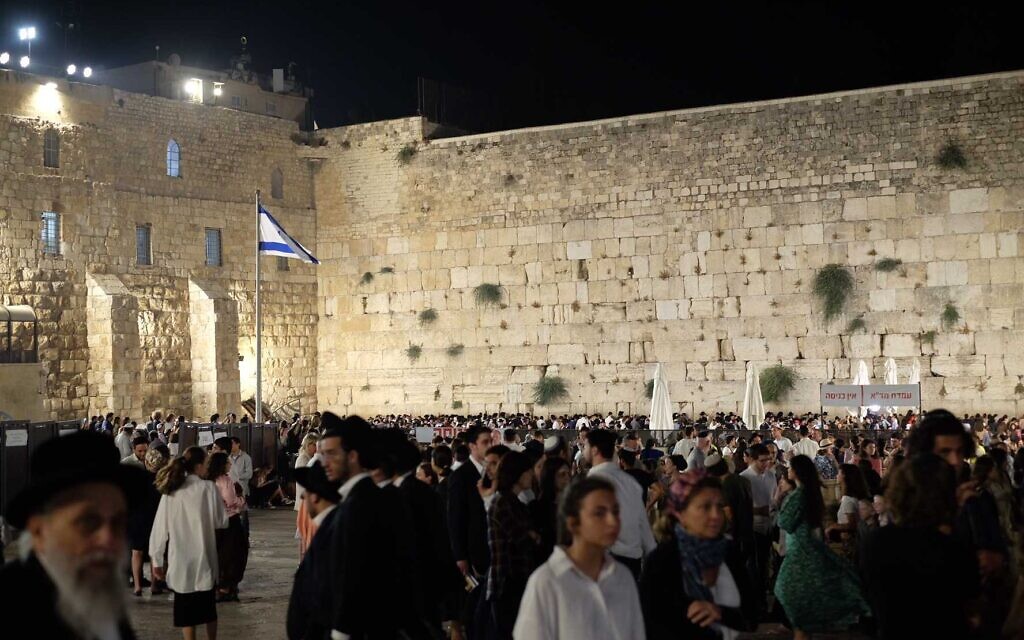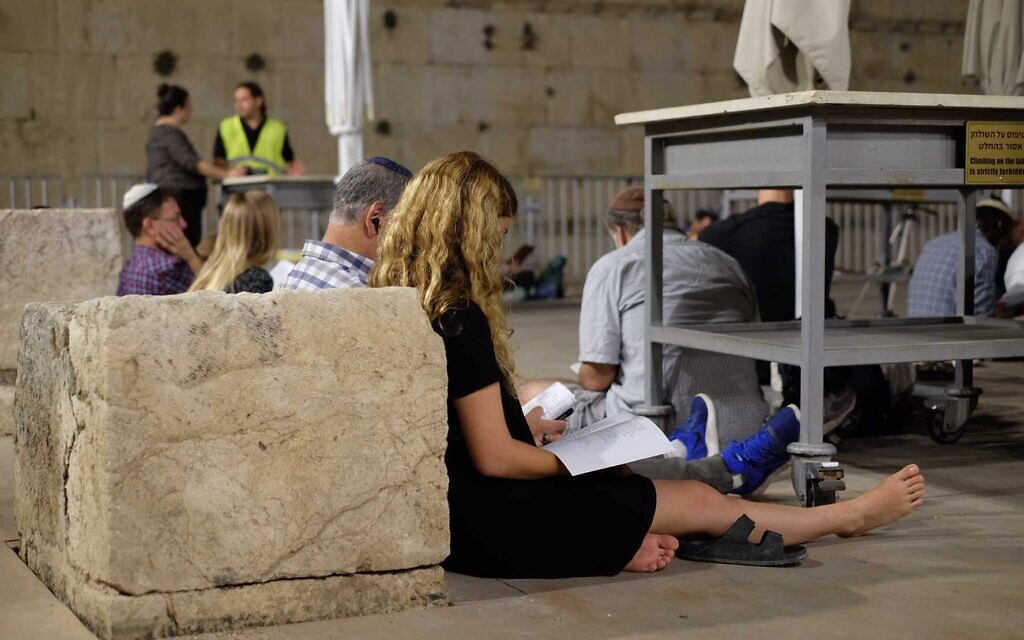An egalitarian prayer service at the Western Wall for the Tisha B’Av day of mourning was held uninterrupted on Saturday night, despite fears that the event would be again overrun by religious extremists as it was last year.
“This was a corrective experience, an important experience for us,” said Rakefet Ginsberg, the CEO of the Masorti Movement, which organized the service.
Over 100 people gathered at the egalitarian section of the Western Wall, sometimes known as Ezrat Yisrael or Robinson’s Arch, for the traditional reading of the Book of Lamentations, or Eicha, on the night of the Tisha B’Av day of mourning, which commemorates the destruction of the two Jewish temples, among other tragedies.
At last year’s service, a group of ultra-Orthodox zealots disrupted the reading, shouting over the worshipers and setting up a gender-segregating barrier, or mechitza, in the egalitarian area, where men and women can mix freely.
Just over a month ago, a similar protest took place during a number of bar and bat mitzvah ceremonies at the egalitarian section.
Get The Times of Israel's Daily Edition by email and never miss our top stories
That incident, along with calls by some right-wing figures to continue these protests at the egalitarian section, raised significant concern that extremists would again disrupt the event.

People gather to hear a reading of the Book of Lamentations at the egalitarian section of the Western Wall on August 6, 2022. (Judah Ari Gross/Times of Israel)
Ultimately, however, no such protests materialized.
The group that organized last year’s protest, the Liba Center, has since expressed a degree of regret for the incident, partly because it mostly garnered sympathy and support for non-Orthodox Jewish denominations, even resulting in some denunciations from leading Orthodox rabbis.
This is in large part due to the Jewish belief that the Second Temple was destroyed due to internal conflict among the Jewish people of the time, traditionally referred to as “baseless hatred.”
Rabbi Ehud Bandel, who spoke before the reading of the Book of Lamentations, referenced this traditional belief in his remarks, citing a teaching of Abraham Isaac Kook, who said that if baseless hatred caused the destruction of the temple, then “baseless love” would cause it to be rebuilt.
“We came here tonight to disseminate baseless love in response to the baseless hatred we saw here a year ago and that we saw just over a month ago,” Bandel said.
Another likely reason why no protests were held on Saturday night was the ongoing fighting between Israel and the Palestinian Islamic Jihad terror group in the Gaza Strip.

People gather to hear a reading of the Book of Lamentations at the Western Wall on August 6, 2022. (Judah Ari Gross/Times of Israel)
Though no rockets have yet been fired at Jerusalem, the fighting and the threat of attacks appear to have prevented a large number of people from traveling to the Old City of Jerusalem. Though the Western Wall’s main plaza still teemed with people, it was clearly far less packed than the organizers had anticipated.
Ginsberg said she didn’t know for sure why protesters refrained from disrupting the service this year, but that she was ultimately just glad that they didn’t.
“This was encouraging. It gave me hope,” she told The Times of Israel. “After all the ‘wars’ here recently, there was an event that was warm and respectful and open.”
No disruptions this year. Eicha reading went smoothly for the roughly 100 attendees.
Now kinot and songs. pic.twitter.com/6GzL8svhvT
— Judah Ari Gross (@JudahAriGross) August 6, 2022
Ginsberg said that while there was a push to get more people to attend in light of last year’s events, this was not a demonstration but purely a religious service.
“It wasn’t a protest, it was prayer. People didn’t come here to fight, especially not on Tisha B’Av,” she said.
The over 100 worshipers who attended the service included men and women, young and old, Reform, Conservative and even a handful of people who identified as Orthodox. They sat on the floor or on low benches in accordance with the Jewish mourning traditions that are followed on Tisha B’Av.

People gather to hear a reading of the Book of Lamentations at the egalitarian section of the Western Wall on August 6, 2022. (Judah Ari Gross/Times of Israel)
Besides Bandel’s opening remarks, the service itself was straightforward, with five different readers intoning the five chapters of the Book of Lamentations, which describes in brutal detail the destruction of Jerusalem and the First Temple.
Ginsberg said they had anticipated more people to attend, but that many from outside of Jerusalem had decided not to come to avoid being caught on the road if there were a rocket attack.
Tour groups from Ramah were also meant to come to the egalitarian section on Sunday morning to hold their own reading of Eicha, but they too had decided to call this off for security reasons.
Also on Saturday evening, President Isaac Herzog released a statement saying that this year, the eve of the Tisha B’Av fast day was a night of “mixed feelings.”
He said that while services were “very moving” for him, at the same time “Israeli citizens are under attack.”
“Our soldiers and members of the defense establishment are at every site, guarding and protecting us,” Herzog said from a synagogue in Ramat Hasharon.
“From here I also ask all citizens to adhere to the instructions of the Home Front Command. That’s the only way we can save lives and win the battle,” he said.


